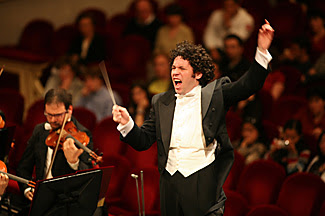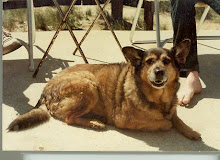
Youth orchestra of Venezuela's poor wows the world
from the Christian Science Monitor
Venezuela's Simón Bolívar Youth Orchestra arrives next week at the New England Conservatory. What drives this revolutionary group of musicians? Since 2001, there have been short-term student and teacher exchanges between the conservatory and Venezuela, and around 250 students with the conservatory's Youth Philharmonic Orchestra (a group for musicians up to 18 years of age) have traveled to Venezuela to play. Those who have taken part say their Venezuelan peers have much to teach them.
"The way the Venezuelans play music is exactly how I always thought it should be played," says Joshua Weilerstein, a violinist at the New England Conservatory who was invited to join the Simón Bolívar Youth Orchestra's current tour after two previous trips to Venezuela. "I think American musicians are incredibly enthusiastic, but there isn't a desperation about the way we play. [The Venezuelans] play as if their lives depend on every note. There's complete passion."
There is also a sense of collectivism and common purpose that might be sacrificed in an emphasis on individual training. "In Venezuela, the most important thing is the orchestra," Mr. Dudamel told The Independent in September. "You create a community, a shared objective."
Why the Venezuelan program, a seemingly obvious model for many places, is not better-known in this country might come down to politics. The administration of current president Hugo Chávez funds most of its $29 million annual budget, and Mr. Chávez, moved by the success of the program in Europe, has pledged to expand it.
With relations between the US and the Chávez administration often tense – and given Chávez's avowed anti-Americanism – shunning the US in favor of European venues might have been more expedient. But Churchill believes that "music will transcend" political discord and "be a model for harmonious relations."
'Freshness, excitement, and energy'
Venezuela's Simón Bolívar Youth Orchestra arrives next week at the New England Conservatory. What drives this revolutionary group of musicians? Since 2001, there have been short-term student and teacher exchanges between the conservatory and Venezuela, and around 250 students with the conservatory's Youth Philharmonic Orchestra (a group for musicians up to 18 years of age) have traveled to Venezuela to play. Those who have taken part say their Venezuelan peers have much to teach them.
"The way the Venezuelans play music is exactly how I always thought it should be played," says Joshua Weilerstein, a violinist at the New England Conservatory who was invited to join the Simón Bolívar Youth Orchestra's current tour after two previous trips to Venezuela. "I think American musicians are incredibly enthusiastic, but there isn't a desperation about the way we play. [The Venezuelans] play as if their lives depend on every note. There's complete passion."
There is also a sense of collectivism and common purpose that might be sacrificed in an emphasis on individual training. "In Venezuela, the most important thing is the orchestra," Mr. Dudamel told The Independent in September. "You create a community, a shared objective."
Why the Venezuelan program, a seemingly obvious model for many places, is not better-known in this country might come down to politics. The administration of current president Hugo Chávez funds most of its $29 million annual budget, and Mr. Chávez, moved by the success of the program in Europe, has pledged to expand it.
With relations between the US and the Chávez administration often tense – and given Chávez's avowed anti-Americanism – shunning the US in favor of European venues might have been more expedient. But Churchill believes that "music will transcend" political discord and "be a model for harmonious relations."
'Freshness, excitement, and energy'
Click on the link below for the rest of the story
http://www.csmonitor.com/2007/1102/p11s02-almp.html






1 comment:
Hey,
Did I hear you say that this orchestra was going to be playing at the Boston Pops? I'd love to go.
Cheers,
Tom
Post a Comment